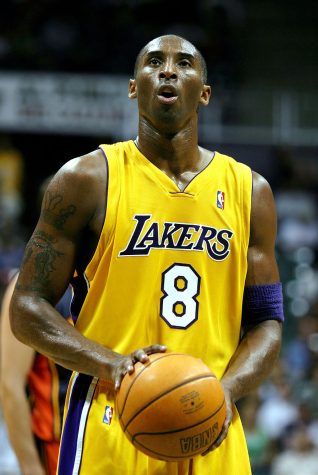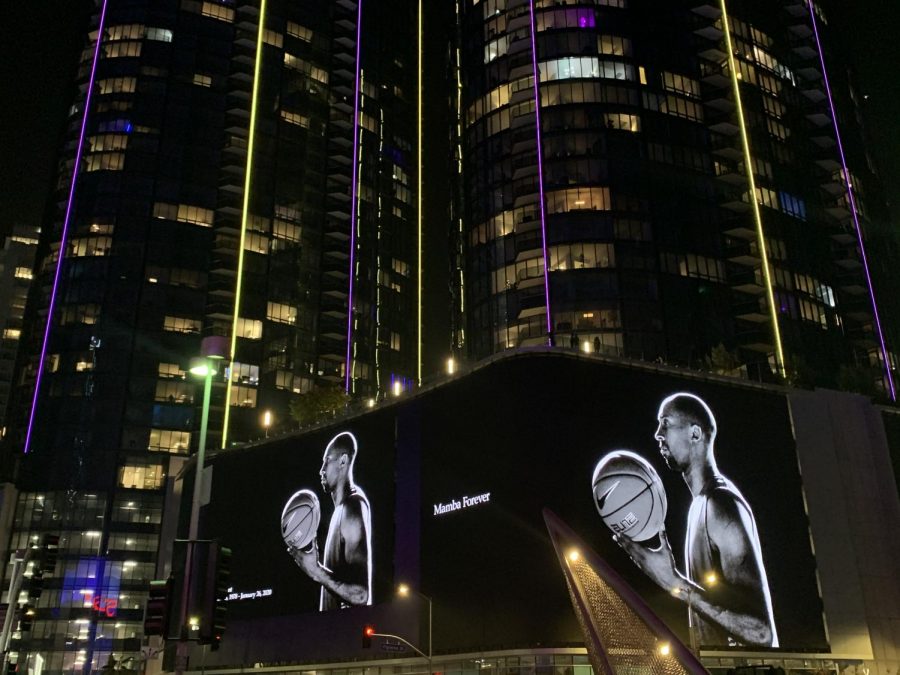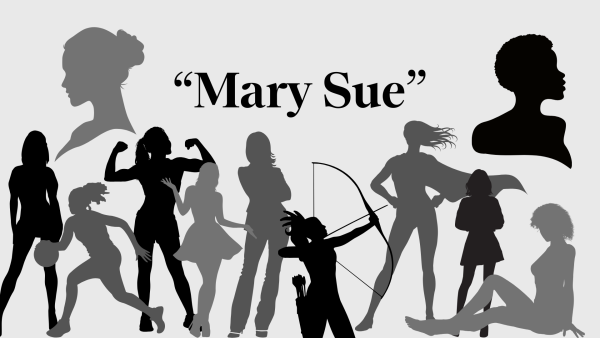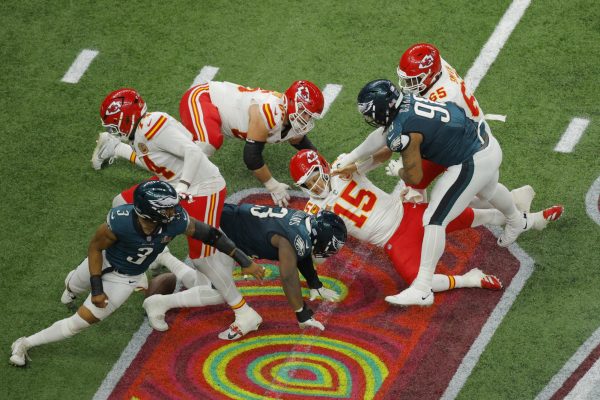Commentary: ‘Mamba Mentality’ — Kobe Bryant’s Los Angeles legacy
Photo credit: Molly Goldberg
A screen across the street from the Staples Center on Sunday, Jan. 26 paid tribute to NBA star Kobe Bryant. Bryant, along with his 13 year old daughter and seven others were killed in a helicopter crash.
It is difficult to articulate how much Kobe meant to people who grew up in Los Angeles. For 20 years he was on the television screens in living rooms and the posters in bedrooms. We watched him grow up. This city’s unrelenting approach to sports grew with him and ultimately became him.
Kobe Bryant came here at age 17, still not a legal adult when he was drafted into the NBA in 1996. In his two-decade career played entirely in this city, Bryant acquired five NBA championship rings, a place among the best to ever play the game and, perhaps above all, the eternal love of his adopted hometown. In death — even as each hour moves us further away from the helicopter crash that killed Bryant, his daughter Gianna and seven others — this love will continue to grow as Bryant’s extraordinary series of accomplishments are frozen in time.
Beyond his on-court expertise, Bryant will be remembered for possessing one of the greatest work ethics and most intelligent minds that I, along with the sports world, have ever seen. While I have never been an avid basketball fan, I could not help but admire Kobe for his passion, motivation and dedication to what he loved. He put the whole team on his shoulders when it mattered most, and even when it did not matter at all. When others quit, Bryant kept going. Wins weren’t just given to Kobe Bryant — he simply wanted them more.
He called this relentless pursuit of greatness the “Mamba Mentality,” a philosophy that became the unofficial value system of this city. Bryant called himself “Black Mamba” after seeing the movie “Kill Bill” in 2003. Inspired by Uma Thurman’s assassin heroine named after the snake, black mamba, Bryant adopted the nickname to highlight his speed, accuracy and overall presence on the basketball court. This mindset allowed him to accomplish so much while simultaneously focusing on being great at basketball.

Kobe Bryant, Lakers shooting guard, stands ready to shoot a free throw during a 2005 pre-season game against the Golden State Warriors. Bryant was essential in bringing together a large point gap late in the second quarter, after the Warriors took the early lead.
“I liked challenging people and making them uncomfortable,” he wrote in his 2018 book, “The Mamba Mentality”. “That’s what leads to introspection and that’s what leads to improvement. You could say I dared people to be their best selves.”
Despite all of the success and admiration that the “Mamba Mentality” allowed Bryant to possess, he was not always perfect. Like all human beings, he made mistakes — a large one in particular that cannot be ignored when reflecting on his legacy.
In 2003, Bryant was charged with sexual assault in Colorado, a case that became international news. He did not admit guilt, but when the charges were dropped after the victim declined to testify, he admitted culpability. He later settled a lawsuit with the woman. The incident in Colorado both permanently and rightfully lost Kobe a great number of fans. The episode would tarnish, but not undo, Bryant’s career. Yet the horror of what he did needs to be acknowledged as a part of his story.
Kobe remained an admired figure throughout the latter half of his career, even after a multitude of setbacks, including injuries. His “Mamba Mentality” would not let him quit. He once stayed in a game to shoot two free throws after tearing his Achilles tendon. And, in the last NBA game he played at the age of 37, he scored 60 points in a win over the Utah Jazz.
After Bryant retired, his focus shifted to other things, mostly making up for lost time with his family. Although his basketball career was over, he continued to apply the “Mamba Mentality” to everything he did. He became an investor, writer and storyteller; he even won an Academy Award for “Dear Basketball,” an animated short film he wrote about his love of the game that had defined his entire life. Furthermore, Bryant mentored younger basketball players, such as Kyrie Irving and even LeBron James, who passed Bryant on the all-time scoring list the night before his passing.
Perhaps most importantly, he spent his final years mentoring his daughter Gianna and coaching her youth basketball team. He was able to pass his wisdom on to his daughter who shared a passion for the game and who had her whole life ahead of her to develop it.
Now, as the world continues to mourn his death, it is clear that the “Mamba Mentality” will be ingrained in the minds of millions for years to come, particularly in Los Angeles, his adopted hometown.
Mamba forever. Los Angeles forever.

Molly Goldberg joined the Oracle staff in 2017 as a staff writer and was promoted Sports Editor for her junior year. This year, she is excited to fill...











![Laila Boodell ('28) gently hugs her show horse, Calvin, while on a walk around her barn. "[Calvin] is gigantic, but he's like a little puppy," Boodell said. "He's insanely obedient."](https://archeroracle.org/wp-content/uploads/2025/02/MG_0073-600x400.jpg)



David Mackay • Feb 21, 2020 at 5:46 pm
Great article Molly! Kobe was an all-time great basketball player, and indeed a flawed individual–we all are. His short comings were well documented and I think he did everything in his power to right his wrongs. None of us can imagine what it’s like to live in the spotlight, but I think he handled it well, and gave back in exemplary ways.
I was lucky to have season tickets to three years of Lakers games in the early 2000’s, years that they won the title. It was exhilarating.
Kobe was robbed of another 40+ years of life, and well-deserved accolades. And the world was robbed of his future contributions. His young daughter and everyone on that helicopter was taken prematurely. My heart goes out to his wife and surviving kids, and all the victims’ families.
Thank you for your article.
David